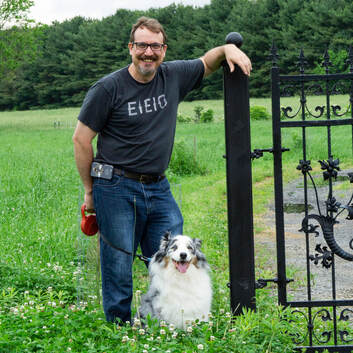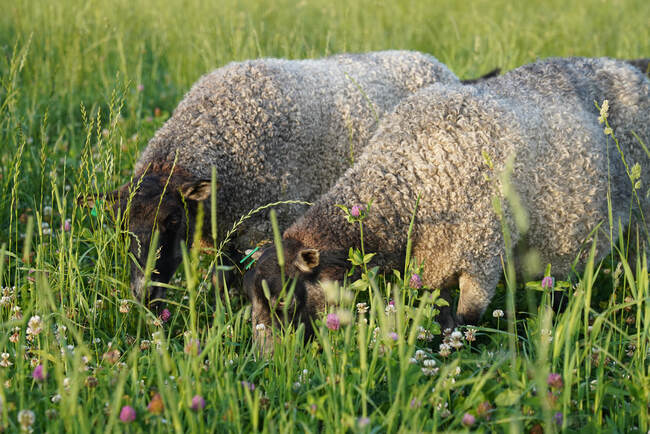Our Story
Smiling Dog Farm is owned and operated by Laura Chandler and Bill Sweeney. Bill developed a love for growing plants while working at a nursery/greenhouse during college, and Laura has had a life-long desire to own a farm. Although we made it a goal to one day run a farm business, we needed to save up to be able to purchase land. At the same time, since neither of us had a farming background, we also had to learn while we were saving. In 2010, we were finally able to realize our dream, purchasing a small farm in the town we were living in. There was no farm infrastructure - the land was undeveloped, as it had been used as a crop farm for many years. We needed to build not only the farm business, but the infrastructure as well. And as new farmers, we needed to learn exactly how to accomplish things on the farm. It took many years of learning, trying new things, and attending workshops and classes. The process seemed slow, but we finally have our farm up and running. Over the years, we have made many friends and acquaintances in the farming community in New Jersey, something that is invaluable when you need help and advice. The process also allowed us to learn what was important to our customers and be able to blend those with our own interests. Our customers are always welcome to visit the farm, watch the animals grazing in the pastures, and enjoy the peaceful and beautiful environment.
About the Farm
When we purchased the farmland in 2010, it had been in use as a crop farm for many years. The soil was in poor condition. Years of tilling and planting, using herbicides and pesticides had taken their toll on the farmland. The soil was depleted, lacking in biodiversity, and weeds were taking over the fields. Our goal was to farm in a sustainable way, regenerating the soil, and converting the land to pasture for grazing livestock. We began by implementing a program of using cover crops to restore fertility, suppress weeds and improve soil health. After several years of cover crop rotations, we planted grasses and legumes to establish pastures for livestock grazing. The pastures are now mature, and we no longer do any tilling or planting (aside from occasional overseeding). The soil is healthy, with earthworms, arthropods and microbes all well-established in the soil food web.
In addition to the field restoration program, we enrolled our farm into the USDA Environmental Quality Incentive Program (EQIP). This partnership has enabled us to make several improvements on the farm that benefit the environment. We have installed windbreaks consisting of trees and shrubs around the perimeter of the farm. These provide habitat for birds and insects, and protect our fields from erosion and prevent drifting of herbicides onto the fields. We also established a pollinator habitat in a small area on the farm. The pollinator habitat is planted with native wildflowers and grasses and is a sanctuary for all kinds of insects, arthropods and even some birds. We also participate in the USDA Rotational Grazing program. Rotational grazing of livestock decreases soil erosion, water runoff, and helps keep livestock healthy.
The farm now plays a role in environmental conservation. Mature grasses in the pasture have roots that grow deep into the soil, allowing water to be absorbed, rather than running off into streams and rivers. With permanent pasture, we have eliminated the need for tilling the fields. We use rotational grazing for our sheep, and do not overstock, so that pastures are maintained in good condition. We do not use herbicides, pesticides or artificial fertilizers, ensuring a healthy environment for insects, birds and other wildlife. All of these things help the farm to function as an ecosystem in balance - healthy soils, healthy pastures, and healthy animals.
In addition to the field restoration program, we enrolled our farm into the USDA Environmental Quality Incentive Program (EQIP). This partnership has enabled us to make several improvements on the farm that benefit the environment. We have installed windbreaks consisting of trees and shrubs around the perimeter of the farm. These provide habitat for birds and insects, and protect our fields from erosion and prevent drifting of herbicides onto the fields. We also established a pollinator habitat in a small area on the farm. The pollinator habitat is planted with native wildflowers and grasses and is a sanctuary for all kinds of insects, arthropods and even some birds. We also participate in the USDA Rotational Grazing program. Rotational grazing of livestock decreases soil erosion, water runoff, and helps keep livestock healthy.
The farm now plays a role in environmental conservation. Mature grasses in the pasture have roots that grow deep into the soil, allowing water to be absorbed, rather than running off into streams and rivers. With permanent pasture, we have eliminated the need for tilling the fields. We use rotational grazing for our sheep, and do not overstock, so that pastures are maintained in good condition. We do not use herbicides, pesticides or artificial fertilizers, ensuring a healthy environment for insects, birds and other wildlife. All of these things help the farm to function as an ecosystem in balance - healthy soils, healthy pastures, and healthy animals.
About Gotland Sheep
The Gotland breed of sheep was originally developed in Sweden, where they are a dual-purpose breed, used for both meat and pelts. Gotlands are relatively new in the United States, but are growing in popularity. They are friendly and curious sheep, and are known for having beautiful fleeces. Their wool is usually gray in color, but can range from a very dark charcoal (almost black) to light gray. Their wool is curly, falling in ringlets, giving them a beautiful appearance. Their fleeces have a soft, silky feel and a shiny, lustrous appearance. Gotland wool is used for fiber arts, felting, weaving and knitting.
Our Gotland sheep are raised entirely on pasture. They are never confined in a barn, preferring to stay outside, grazing on the lush pasture grasses that provide all the nutrition they need to stay healthy and grow their beautiful fleeces. Our Gotland fiber is sold as raw fleece, and yarn.
You can see photographs of our Gotland sheep in the Sheep at Smiling Dog Farm Gallery, and watch a video interview of us that was produced by the NJ Fibershed.
Our Gotland sheep are raised entirely on pasture. They are never confined in a barn, preferring to stay outside, grazing on the lush pasture grasses that provide all the nutrition they need to stay healthy and grow their beautiful fleeces. Our Gotland fiber is sold as raw fleece, and yarn.
You can see photographs of our Gotland sheep in the Sheep at Smiling Dog Farm Gallery, and watch a video interview of us that was produced by the NJ Fibershed.



